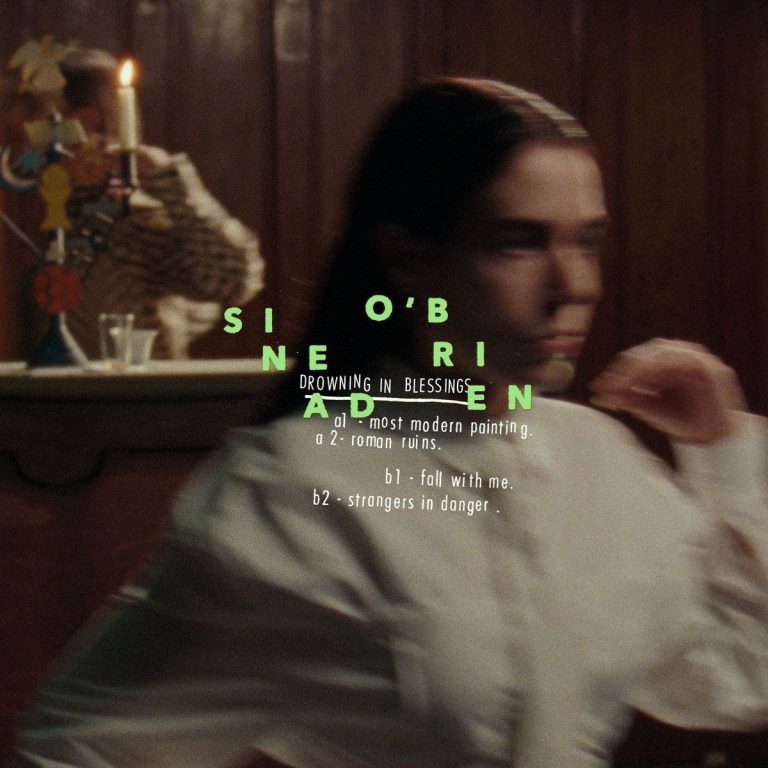Something strikes you when “Most Modern Painting”, the first track on Irish performer Sinead O’Brien’s debut EP Drowning in Blessings, begins: the musicality of the song. O’Brien is called a spoken-word artist, a punk poet, but her voice floats through an ‘other’ space; not quite poetic monologue; nor expressly delivered as singing either.
Kae Tempest could seem a natural contemporary comparison, as they are definitively a poet first and foremost (they won the prestigious Ted Hughes Award in 2013), but it’s not that simple. O’Brien’s journey to this point is more unconventional – as is the final product.
A quiet upbringing in Limerick was followed by a spell in Dublin to study, then onto Paris to work with Chanel amongst others as a fashion designer. On a London sojourn, O’Brien was invited to perform at a spoken-word gig at The Windmill in Brixton, with no prior live experience. She grasped the opportunity and subsequently attracted the attention of one John Cooper Clarke, the punk poet doyen of Manchester, which began her path to releasing music.
This incohesive path feels like both a blessing and a curse. There are moments in Drowning in Blessings‘ four tracks where the words unspool so freely and chaotically that O’Brien’s lack of poetic pretension is a welcome unshackling. Lines tumble out as if by accident, yet are still suffused with meaning. At other points, however, her digressions crumble, there are unsubtle pauses, O’Brien attempting to conjure her next linguistic trick, and the guitar is left to fill the gap, particularly on the stuttering and clattering “Most Modern Painting”.
It’s her collaborators Julian Hanson and Oscar Robertson who handle the instrumentation, on guitar and drums respectively, while O’Brien focuses on the words. In this way, there’s an almost Morrissey and Marr balance between cold and hot on display: her stark speech of woes and the failures of modernity contrast with the warmth of Hanson’s rhythmic guitar.
O’Brien’s lyrics contend with the human condition, be it our lurid desires or the pressures of living in this precarious current moment. She is coolly detached but magnetically imposing (she works in fashion, after all) as she does it, all grace and grit, Irish artistic essence.
The diaristic record is less poetry, more immense notebook thoughts coalesced and patched together; less songs, more stream-of-consciousness. O’Brien travels between surreality and straightness, even within the same song. “What wouldn’t melt would set / Salt wouldn’t shake me / Terra cotta (sun burnt) planes / Would not take me away,” she cryptically spits on “Roman Ruins”; in a later verse, she cries “My eyes must have been trapped / For I am not sleeping / I’ve got a lot of time / But I haven’t been thinking.”
The glam and upbeat “Fall With Me” contains the simplest wordplay but is also the most suffocating. The dancing grooves of the guitar meander around lines like “This is an ode to the most basic city / This is the eulogy to the state I adore / Fall with me”; 2020 is truly one continuous fall. “Strangers In Danger” sways under a galloping melodic rhythm as O’Brien reflects on the personal amidst the wider world. It closes with a line that is an exercise in self-reflexivity: “What worth do you unearth with the way of your words?”. A question for the poet at the end of his monologue.
Drowning in Blessings often recalls the wonderful but short-lived Glasgow band Life Without Buildings; they were a band whose entire existence was predicated on belonging and thriving in that ‘other’ space, their lead singer Sue Tompkins at once shouting, screaming, lilting, talking her thoughts and feelings. That band released one real record, Any Other City; all one can hope is that O’Brien has a more prolonged career in music to see how she can develop her sonic capabilities.

